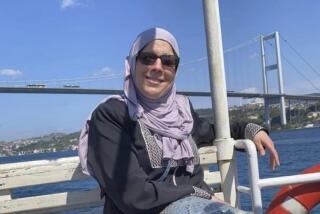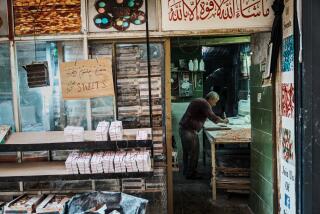‘We Are Just Victims’
- Share via
It’s a long way from Orange County to Khartoum, Sudan’s sprawling capital on the banks of the Blue Nile--and nobody knows that better than Mustafa S. Ismaeil, who considers both places home.
For nearly a decade, the Sudanese-born Ismaeil has lived in Newport Beach while also helping to oversee operations at the family’s candy factory in Sudan.
But the Sugar Sweet and Candy Factory is no more, having had the misfortune to abut El-Shifa Pharmaceutical plant, which was destroyed last week by American missiles. Now Ismaeil--true to the American spirit he has so firmly adopted--plans to sue.
“I think I have a strong chance to win for one simple reason: I don’t have anything to do with chemical weapons,” Ismaeil, with barely a hint of a Sudanese accent, said Saturday as he looked over the ruins of the family business. “This is a sweets factory, and I am sure the U.S. government knows that. We are just victims.”
Tomahawk missiles flew through the night skies of Sudan and slammed into El-Shifa. Damage was not limited to the pharmaceutical plant, which the U.S. government alleges was producing chemical weapons but which Sudan insists was making medicine.
The force of the blasts--five of them, by most witnesses’ accounts--also wrecked the candy factory, which was just on the other side of a low wall from El-Shifa’s targeted buildings and barely 50 feet from where some missiles fell.
Worst of all, says Ismaeil, a guard working night duty was hit by flying debris and died Friday in a Khartoum hospital. Ismaeil, who studied at American University in Cairo from 1986 to 1987 and gained resident status in the United States afterward, said he sees nothing wrong with suing his adopted homeland for damages to the family business, which his father started in the 1980s.
He is hoping, he said, that Washington can produce proof that the neighboring factory was indeed producing chemical weapons. Even if it does that, Ismaeil said he’ll still pursue legal action.
Throughout the neighborhood of wide dirt roads, sprawling factory complexes and squat mud homes, most people say they have no reason to believe El-Shifa was anything other than a medicine factory. But one man who works nearby said he always found it odd that in the evening after regular working hours, heavily armed guards with walkie-talkies would surround the factory and carefully screen anyone coming up the road.
Beside the charred remains of El-Shifa on Saturday, white-hot embers still crackled and hissed and clouds of smoke rose from the piles of ash. A crater 10 feet deep and 20 feet wide sat beneath a gaping hole in the roof where one missile landed, surrounded by tens of thousands of tiny brown medicine bottles. “If there were any chemical weapons in here, the people around this place would have been dead by now,” said Police Lt. Gen. Abubakar Mohd, the officer in charge of the Sudanese police probe of the attack.
The United States has alleged that the factory was a front for a plant producing elements of deadly nerve gas and that it was financed in part by Osama bin Laden, the Saudi millionaire whom Washington suspects of orchestrating the Aug. 7 bombings at the U.S. embassies in Nairobi, Kenya, and Dar es Salaam, Tanzania.
“Maybe they have the wrong information,” Mohd said, speculating that Sudanese opposition groups could have misled the United States. “Just because bin Laden was here, the United States thinks we support him. But bin Laden was also in London, in Saudi Arabia, in other countries. Just because he was in a country, that means it supported him?”
More to Read
Sign up for Essential California
The most important California stories and recommendations in your inbox every morning.
You may occasionally receive promotional content from the Los Angeles Times.














